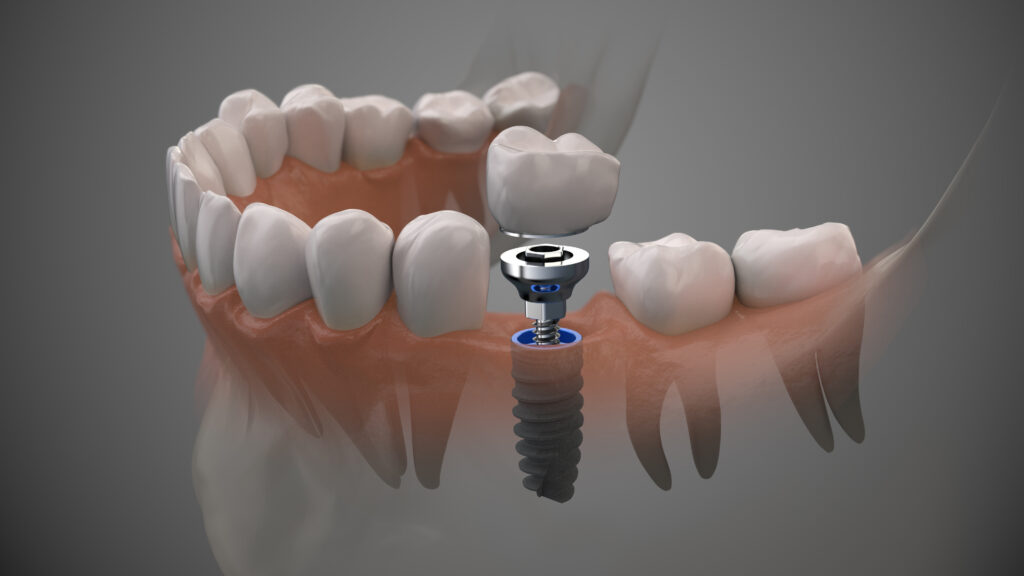
Losing a tooth can be distressing, leaving many feeling self-conscious about their appearance. However, there’s no need to be embarrassed—dental implants offer a permanent, yet natural-looking solution to missing teeth.
If you’ve been considering dental implants but are unsure about the process, this guide will walk you through each step so you can feel confident about your decision.
Pre-procedure consultation
To get dental implants, you must first consult your dentist. During this appointment, they will assess your overall dental health to check if you are a good candidate for the procedure.
At this stage, you will undergo a series of tests, including X-rays and 3D imaging, to evaluate your bone density, gum health, and the position of your remaining teeth. The dentist will also examine your jawbone to see if it is strong enough to support the implant. If not, they may recommend a bone graft.
Medical history & health considerations
Before proceeding with the implant procedure, it’s essential to discuss your complete medical history with your dentist. Certain health conditions, such as diabetes, heart disease, or immune system issues, may affect the success of dental implants.
Your dentist will need to know about any medications you’re taking, including blood thinners or medications for osteoporosis, as these can impact healing after the surgery. Based on your health background, the dentist will tailor a treatment plan that minimises risks and ensures the best outcome.
Dental preparations
Once you’ve been deemed a suitable candidate, dental preparations will begin. If you still have damaged teeth that need to be replaced, they will be extracted before the implant procedure. For some patients, the implant can be placed during the same appointment as the extraction, but this depends on the health of your gums and jawbone.
Nutritional guidelines
Proper nutrition is crucial for promoting healing after dental implant surgery. Before the procedure, your dentist may recommend that you follow specific dietary guidelines. For example, in the days leading up to the procedure, you may be advised to increase your intake of nutrient-dense foods rich in vitamins and minerals, particularly vitamin C and calcium, to support bone health.
Managing anxiety & fear
Dental procedures can cause anxiety for many people, especially when surgery is involved. It’s important to discuss any fears or concerns with your dentist before the day of the surgery. Dental offices have various forms of sedation, such as oral sedatives, nitrous oxide (laughing gas), or intravenous sedation, to help manage anxiety.
Your dentist will guide you on the steps and explain what to expect so you feel more comfortable on the day of the surgery.
The procedure
On the day of the procedure, you will first receive anaesthesia to numb the area around the implant site to minimise pain during the surgery. The procedure begins with cutting into the gum to access the jawbone. A small hole is then drilled into it, where the implant (a titanium post) will be placed.
The titanium post acts as a foundation for the new tooth. After the dental implant is secured in place, the gum is stitched closed, covering the implant.
Sometimes, your dentist may place a temporary crown to preserve the appearance of your smile while your jawbone fuses with it. Fusion can take several months, during which time the implant will become permanently anchored to your jawbone.
Once complete, a small connector (called an abutment) will be attached to the dental implant, and your permanent crown will be placed on top. The crown is customised to look like your natural teeth in colour, size, and shape.
Post-procedure care
After the dental implant procedure, your dentist will give detailed aftercare instructions, such as:
- Managing pain: Over-the-counter pain medications such as ibuprofen can help alleviate discomfort in the days following surgery. Your dentist may also prescribe pain relievers if necessary.
- Keeping the surgical site clean: Good oral hygiene is essential, but you must be cautious around the implant area. Use a soft-bristled brush and avoid brushing the surgical site for the first few days.
- Reducing swelling: Applying an ice pack to the outside of your cheek near the implant site can help reduce swelling.
- Avoiding strenuous activities: Physical exertion can increase swelling or bleeding, so it’s best to rest for a few days after the procedure.
Your dentist will schedule follow-up appointments to monitor your healing and ensure it progresses smoothly.
Dental implants in Singapore
There are several steps to getting dental implants in Singapore. While the process can take time, the result is a lasting, natural-looking replacement that dramatically enhances your quality of life. With proper care and guidance, dental implants can be an effective solution for missing or damaged teeth.
If you’re considering dental implants, Orchard Scotts Dental offers expert care from trained professionals. Our commitment to patient comfort ensures your dental implant experience is smooth and successful. For individuals with dental issues like chipped or uneven teeth, we also provide dental veneers to improve your smile.
Book a consultation today to learn more about dental implants and their cost.

